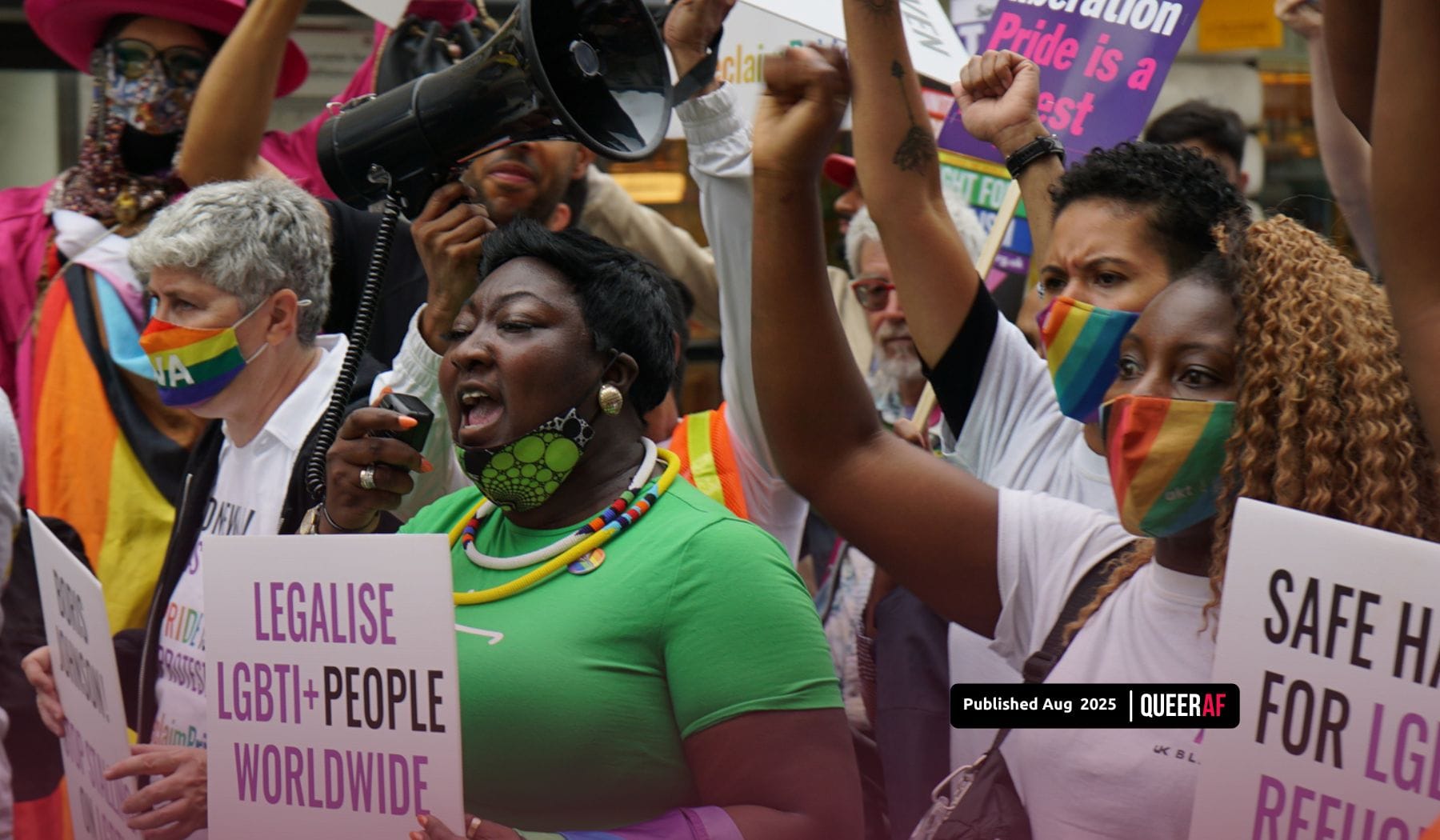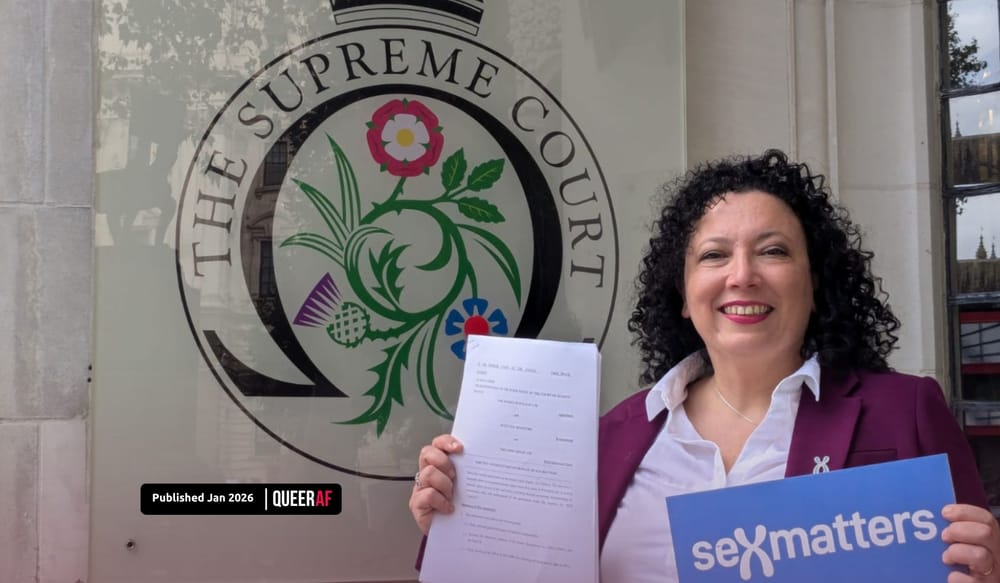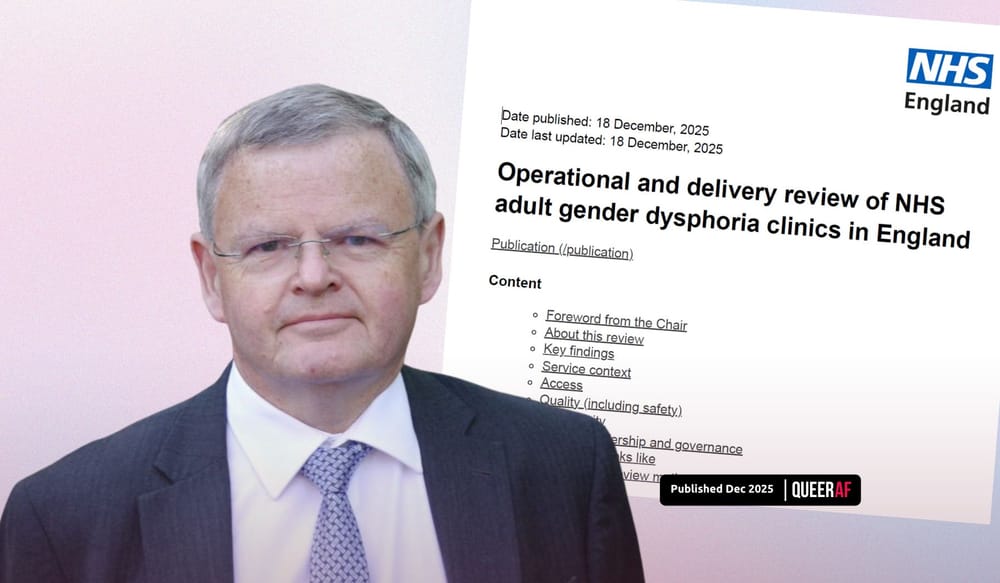
TL;DR: Labour’s new Crime and Policing Bill is set to drastically expand police powers relating to public protest, in reaction to two years of pro-Palestine marches. LGBTQIA+ charities have welcomed the new bill because it expands hate-crime laws, but the new powers will also have a harmful impact on LGBTQIA+ people at protests and potentially even at Pride events.
The police will have the power to make it a criminal offence to cover your face at a public protest if Labour’s proposed policing bill becomes law, putting LGBTQIA+ people attending Pride events in danger of being outed.
The new police powers are contained in the Crime and Policing Bill, which is currently waiting to be debated for a second time by the House of Lords. The bill contains a raft of measures criminalising certain behaviours or actions in public, including two amendments related to protests that experts warn will put LGBTQIA+ people at risk.
While both of these amendments, and the bill as a whole, are understood by campaign groups like Amnesty International and Palestinian solidarity groups to be the government’s response to pro-Palestine marches over the last two years – they will affect all people attending protests in the UK.
The plans will include specific ramifications for LGBTQIA+ people organising or attending marches. This would include protests including Pride parades, demonstrations against the government’s new RSE guidance, vigils for trans kids outside MPs offices, and protests against the Supreme Court ruling.
There are two amendments that experts told QueerAF are particularly worrying for LGBTQIA+ people. One is a police power to ban face covering at protests – whether that’s obscuring your identity using a mask, scarf or even a placard. The second is a clause that would allow police to divert or cancel a planned march if attendees from a place of worship along the route complain that they would be prevented from accessing their religious site due to a fear of intimidation - The Guardian
Further police powers regarding the use of facial recognition technology at protests are also being highlighted by activists as being deeply concerning for both LGBTQIA+ and Black communities.
Face coverings at protests can be banned under new powers
At the moment, someone wearing a face covering at a protest who is asked to remove it by police can be arrested if they refuse to do so. However, if the new policing bill passes – which it’s expected to – police could implement blanket bans on face coverings for particular protests if they believe ‘criminal activity’ is likely to take place. This will allow them to then arrest anyone wearing a face covering at a protest.
There will be three defences against this – if the face covering is for health, work or religious reasons – but they can only be used after a person has been taken to a police station and charged, and will not be a defence against arrest.
While the ban on face coverings can only be implemented by police if they believe ‘criminal activity’ will take place at the protest, Tom Southerden, programme director for law and human rights at Amnesty International, explains that the bar for what has been considered criminal has been significantly lowered after “years and years of anti-protest legislation have made criminal offences that didn't use to exist when it comes to protest”.
“Lots of new criminal offences have been created and old ones have been made more severe,” he told QueerAF. “So if you're in a situation where police put conditions on a protest – like you're not allowed to go down that street or it has to start at a certain time – breaching those conditions is a criminal offence. So if police think those conditions on the protest might be breached then they can impose a facial coverings ban.”
Wearing a face covering would be criminalised even if an LGBTQIA+ person needs to use one to protect their identity because they are worried about domestic abuse based on their gender identity or sexuality, fear having their political views made public, or aren’t out to everyone in their family or to their work colleagues.
“The practical effect is that [the law] would intimidate people into not taking part at all,” Southerden says.
What does the new bill say about places of worship?
The police already have powers to tell protest organisers they can’t go down a particular street or within a certain distance of a particular building. But they can currently only use those powers in relatively narrow circumstances. With the new law, police will have expanded powers and a growing list of circumstances that allow them to impose restrictions on a protest.
One such clause in the new bill will give police the power to divert or cancel a protest if it goes near a religious building where attendees say that the protest will intimidate them. This is seen to be aimed at disrupting pro-Palestine protests in central London, where there are a number of synagogues - Novara Media
But it will also impact LGBTQIA+ protestors, because something as simple as complaints from a homophobic church along a Pride route could prevent that march from taking place.
“It just takes one individual to complain and say actually we don't want them coming past our building because we find it offensive, or there's enough noise created by a gender-critical group or an Evangelical group saying we don't want LGBTQIA+ people coming past our building or our church,” Saba Ali, activist and UK Black Pride’s Safety and Met Police liaison manager, tells QueerAF.
Another issue in the new bill, according to Ali, is increased police powers around facial recognition technology. QueerAF now understands that police wanted to use these powers at Pride in London for the past two years, and discussed using them for UK Black Pride this year. So far those suggestions have been successfully resisted by the organisers.
“[Facial recognition technology] takes away any anonymity an individual has,” Ali says. “There've been incidents where facial recognition has picked the wrong people, the wrong people have been arrested, and it's caused a lot of trauma for them.”
She points to April’s Supreme Court ruling, and says that with facial recognition technology in use, an incident in a bathroom or toilet involving a trans person could potentially out them and “put their life at risk”.
Live facial recognition technology was used by the Met Police at this year’s Notting Hill Carnival, which Ali (speaking before Carnival took place) says is a worrying trend. Equalities watchdog EHRC also warned that use of the technology would be unlawful and have a “chilling effect” on people’s rights - The Guardian
“It goes back to the over-policing and over-targeting of both queer and Black spaces,” Ali says. “If they're going to start doing it [facial recognition technology] there [at Carnival], then are they going to start doing it at London Trans+ Pride? Are they going to start doing it at other bigger Pride events?”
Analysis: History tells us police will abuse power
This new policing bill comes hot on the heels of four anti-protest bills in as many years. These pieces of legislation were drafted by ministers in response to significant protest movements, including Black Lives Matter, Just Stop Oil, Extinction Rebellion, and the more recent pro-Palestine movement.
But unlike some of its predecessors, which resulted in alarm bells being sounded by activists, NGOs, left-wing media and MPs, 2025’s Crime and Policing Bill is largely going under the radar - Shanice McBean
Perhaps this is because the bill was welcomed by some LGBTQIA+ and feminist charities for proposing “tougher” hate crime legislation and a partial win on legalising abortion. Stonewall called this bill “an important milestone towards achieving equality for LGBTQ+ people” - Stonewall
But hate crime laws do not keep us safe, because history has shown us the police do not keep queer people safe. This will become more acute when they are given more powers to arrest us at protests, and have announced plans to strip-search us in accordance with the transphobic Supreme Court ruling - National Police Chiefs’ Council
Some Pride organisers contacted by QueerAF for this piece had a ‘not to worry’ approach to the new policing bill – saying that Pride events are not a site of ‘criminal activity’ and so police won’t be able to use these new powers to implement bans on face coverings at Pride, for example.
But recent history tells a different story.
Take Pride in London, the UK’s largest Pride event. Five Youth Demand activists were arrested there in 2025 for a pro-Palestine action. Thirty-three people were arrested there in 2024 on public nuisance grounds. And seven Just Stop Oil protestors were arrested in 2023 for trying to stop the march over its ties to companies investing in new oil and gas drilling. Sarah Jane Baker was also arrested in 2023 after telling crowds at London Trans+ Pride to “punch a Terf”. She was later cleared of inciting violence by a court, but still spent nearly a year in prison as the arrest breached her bail conditions - What The Trans
It seems evident that the police already have the criminal activity grounds they need to bring in a ban on face coverings at Pride or a trans rights march – and if they don’t, the government can simply criminalise more aspects of public protest until they do.
Supporting Palestine Action wasn’t a crime until the group was proscribed as a terrorist organisation last month, and since then hundreds have been arrested for holding signs supporting the group. Laws are easily extendable, especially under a government committed to outperforming Reform UK. With anti-LGBTQIA+ content censorship on the rise, how soon before attending an LGBTQIA+ protest is deemed ‘adult’ and illegal for families to attend? - QueerAF
This bill looks set to become law, although the House of Lords could remove some of the harsher amendments around protest policing – but these will only be retained if MPs are convinced to back those changes by constituents once the bill is back in the House of Commons.
Pride started as a queer uprising against police brutality – our elders surely would have taken this expansion of police powers seriously and fought back. Why aren’t we?

What this bill tells us about the UK in 2025
This bill uses a classic political tactic: carrot and stick. It's one we've seen Labour employ in recent months to degrade LGBTQIA+ rights, and stunt the queer charity sector's response.
The bill contains a positive change, so the focus from human rights groups is on that - not on the potential negatives. The government dangles this carrot, so they don't get hit with a critical stick. And the sector leans into this, in pursuit of building a better relationship with the government.
We saw a similar approach to the recent Relationships and Sex Education guidance, dubbed 'Section 28 2.0'. The wider media only did a smattering of stories about a positive aspect of the guidance - the addition of information about misogyny to the curriculum - before we explained the anti-trans ramifications. Within hours of our coverage, the rest of the media finally picked up on it.
Vic Parsons had to dig deep behind the headlines and do extensive interviews and research to highlight the dangers of this bill for the LGBTQIA+ community.
But as their reporting lays bare, there are dangerous shifts taking place in British policy that could drastically limit our community's ability to fight back against the growing anti-LGBTQIA+ rhetoric against us.
We can only deliver these detailed explainers with your help. We're able to do them because we're a reader-funded outlet that can deliver on what counts - not celebrity clickbait and culture war stories like the gay and mainstream press deliver about our community.
If you believe in the accountability, practical explainers and detailed queer journalism that our reporters like Vic Parsons are delivering, please - become a paying subscriber to this newsletter. You can help out with just a few quid a month.











